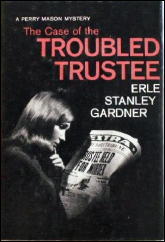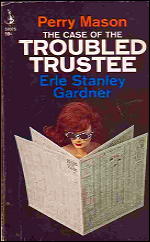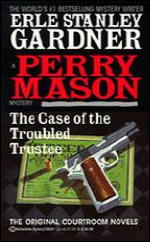Sat 28 Jan 2012
Archived Review: ERLE STANLEY GARDNER – The Case of the Troubled Trustee.
Posted by Steve under Reviews[9] Comments
ERLE STANLEY GARDNER – The Case of the Troubled Trustee. William Morrow & Co., hardcover, 1965. Pocket, paperback, 1967; many subsequent printings. Ballantine, paperback, April 1995.

If you’d care to know how a mystery writer whose career began back in the 1920s felt about hippies, beatniks and the “love revolution,” look no further. The trustee to a young girl’s estate is in the process of hiring Perry Mason to represent him (page 6):
And so for four years Kerry Dutton has been in charge of what’s called a spendthrift trust for her, but he’s made not a single accounting for it, and all of the investments he’s made using the money are in his name. Which he did for the best of motives. He’s in love with her. Later, on page 12, Perry Mason is discussing the situation with Della, his long-time confidential secretary:

If Della had any other implications in mind, they seem to have eluded Perry altogether.
Some short while back, I reviewed a book by Gardner’s alter ego A. A. Fair, and if I may quote myself, what I said at the time was that his “strong point was plotting.” That was Kept Women Can’t Quit, which came out in 1960. Here is it five years later in Gardner’s career, and unless I missed something — several somethings, as a matter of fact — the best I can call the plotting is sloppy.
On page 103, a courtroom witness seems to know about the $250,000 Dutton has accrued in his own account, based on the money entrusted to him; yet on page 128, the judge is astonished to have Dutton testify that he had done so, and I don’t even see how the previous witness could possibly have known.

Chapter 17 centers around a witness who claims he heard a shot just before putting on the ten o’clock news, which is not really time enough to help Perry’s client, but somehow Perry thinks it does. And on page 149, when the witness appears in court, he says he heard the shot just before the nine o’clock news. Hamilton Burger jumped to his feet to strike out the testimony, and so did I.
There’s more. On page 93, Perry learns that the murder victim had been at one time briefly questioned about a murder that took place in a rooming house where he was staying, but fortunately he had an alibi. On page 171, it turns out that were a whole series of such rooming house murders, that he had lived in two of them, and that the police had “descended on him like a ton of bricks.”
And if you were to allow me to continue just a little longer, I’d say that there is a huge chew of coincidence still to come, one so large that it takes a couple of sizable gulps and another big swallow to get it down.
It’s all fixable, except for perhaps the latter, and of course you do have to realize that coincidences like this one actually happen. All in all, though, I really think Gardner was coasting with this one, and he was making it up as he went along. And he never went back to tidy up the loose ends.
[UPDATE] 01-28-12. It’s been too long since I wrote this review for me to remember the details, especially those dealing with the points I brought up as examples as poor plotting. I wish I’d been clearer about each of them at the time, when they were still fresh, because to me now, it sounds as though I may have been sounding off on very minor discrepancies.
I don’t think I was, however, so I haven’t edited this review to delete them or change anything I said. If you’re reading a detective novel in which the clues, the timing of events and the testimony of witnesses is important, then so are the details, and that’s the point of my review.
I wrote this rather negative assessment, as I recall, with a great deal of reluctance. Gardner was the first “grown-up” author that I ever read. I still remember being allowed the first time into the adult section of the local library and seeing a The Case of the Lucky Legs on the shelf. I grabbed it, took it home with me, and I thought it was terrific.
As for Gardner’s opinion of the hippie movement, he was 76 at the time, and I might suggest that in the mid-60s no one over 30 understood either the Love Generation or the Sexual Revolution, except for the long hair and scruffy beards.
January 28th, 2012 at 8:40 pm
Well, I have not read this one, but I think the trustee summed up the ‘Love Generation’ pretty precisely.
We are nowadays paying the price of these people having achieved their ‘March Through The Institutions’.
The Doc
January 28th, 2012 at 9:27 pm
You’re speaking of Rudi Dutschke, of course? — and in his case, with only a limited knowledge on my part of the way he took over the German student movement, I can’t say I disagree.
The trustee was speaking of the Love Generation, California style, and even so, while he may have been right in assessing its excesses, I still don’t think he (or Gardner) really understood how historically significant the movement was, for all of its naiveté and directions it might have taken and didn’t.
January 28th, 2012 at 10:47 pm
Groovy. Never knew Perry could be so psychedelic.
January 29th, 2012 at 8:05 pm
Tim
Perry psychedelic? I never thought of him in that light!
He was fairly hard-boiled in the beginning, but even though he always played fast and easy with the evidence in a murder case, he changed over the years and became a solid member of the establishment, dedicated only to his work in defending defendants.
As that quote by Della in my review proves, I should think. I have a feeling that Gardner was feeling some pressure from readers who wondered how long the purely professional relationship between Della and Perry was going to go on, and that was his response. I don’t imagine that the two of them ever shared a dinner together except after winning the case, steak and all the trimmings, and with Paul Drake along acting as chaperone. In case Della got any ideas.
January 29th, 2012 at 2:00 pm
Well, the Golden Age had its Bright Young Things, but they were better groomed!
Jeffrey Marks’ biography of Gardner is finished now and his agent is looking for a publisher, by the way.
January 29th, 2012 at 8:08 pm
Curt
Jeff Marks is looking for a publisher? That’s not good news. I thought he had a contract for the book, which I’m certainly looking forward to. I hope things work out for him.
January 29th, 2012 at 11:56 pm
I think you will find the same opinion of the younger generation in a number of other authors’ works, but perhaps not quite so blatant. Agatha Christie comes to mind and so does Chester Gould in his Dick Tracy comic strip. Phrases about long hair and dirty fingernails are almost verbatim, book after book. And remember a non fiction book by Gardner called Cops on Campus and Crime in the Streets? He was a fairly conservative individual.
January 30th, 2012 at 1:15 pm
“As for Gardner’s opinion of the hippie movement, he was 76 at the time, and I might suggest that in the mid-60s no one over 30 understood…”
I was 18, and I’m not sure many of us ‘understood’ — other than that we were having a great time, that we were giving the Establishment the finger (which is always fun for kids), and that we had a hazy sort of pseudophilosophy that made us feel wise and important.
I really enjoy the Mason TV series reruns, but their depictions of young people indicate that Gardner was not the only one who didn’t ‘get it’ — neither did the show’s writers/directors/etc. I suspect that older people have never seen much more than the surface of youth culture (I doubt that Deanna Durbin and Andy Hardy were really representative of thirties teens).
The few times I’ve tried them, I’ve never enjoyed the Mason books. Yes, they’re (usually) well-plotted, but the characterizations are horrible. Other than Perry/Della/Paul, everybody is cardboard (and thin cardboard at that).
January 30th, 2012 at 3:37 pm
Not to be too contrarian, but I think it’s Perry, Della and Paul who have little depth, along with Lt. Tragg, Hamilton Burger and any other of the recurring characters. They’re essentially the same one book to the next. The clients, on the other hand, can be seen sideways, but if you were to pin me down, I’d have to agree, only so far as to fit into the plot.
It didn’t matter so much back in Gardner’s heyday. People read his books for the plots, and the comfort zone the books put them in. I know my grandparents devoured them as soon as the next installment arrived in the SATURDAY EVENING POST. I waited for the book club editions arrived, and read them right out of the box.
But when the plotting became sloppy, it was only momentum, I think, that kept Gardner’s readers going.
I think you’re quite right about youth culture as it’s been portrayed over the years in mass media. I’m not the first to say it, but whenever a particular fad started to show up in comic books, you knew the fad was over.